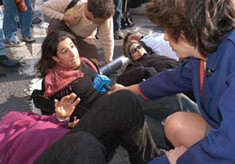The Electronic Intifada 22 November 2004

Liat Weingart speaking to the press during an anti-war protest in March 2003. (Liv Leader)
In the midst of all this, two extraordinary Jewish Voice for Peace (JVP) women have snapped me out of my sense of the normalcy of violence in Palestine. They’ve reminded me over and over again that, though we didn’t think it could possibly get worse, it is. They’ve reconnected me to my sense of horror and desperation and urgency, and they’ve forced me to stare it in the face, rather than run from it. Frankly, I’d rather run away from the fact that my Palestinian friend’s 10 year old son was taken into a room alone with two Israeli soldiers at the airport and interrogated. I’d rather run away from the recent report that Palestinian men were lined up and shot “execution style.” I want no part of it, and yet I am a part of it.
When I’m reminded of what’s going on over there, I start running. I run to work, I run at work, I talk fast to people on the phone, I spill my tea on my desk. I react to whatever phone call comes in, whatever crisis is brewing. The long-term things that we’re trying to do here fall off my agenda — build a vibrant coalition to win the Caterpillar campaign, build strong and long-term relationships with our active members and donors, create an organization that will be ready to fight for justice until we absolutely get it. Instead, I react to whatever’s flying in front of my face. At the seminal panic moment, when I’m answering phone while writing an email while talking to my co-workers while spilling tea on my desk, how can anyone expect me to figure out whether sanctions are a good idea? Or how best to react to the mainstream media’s distortions of Arafat’s legacy?
The truth is that I need to keep the reality on the ground with me at every moment. But I also need to keep my own power and leverage it very wisely. JVP is getting US Jews to stand up for what they know to be right, and we’re reinvigorating the US Jewish community with a much-needed culture of dissent. And organizations like the Presbyterian Church USA are taking courageous stands in part because they know they’re in good company. They, and others against the occupation, rely on US Jews to build powerful organizations that will be able to support them to take a stand for justice. They made it clear that they could have used a lot more support than we could give, but what we had was enough to help them stake their claim and not back down, despite immense pressure. People are relying on us to build a loud and proud Jewish community that will stand up for the most unpopular position in the US Jewish world.
The situation looks impossible, it looks intractable. But it’s not. We don’t need every Jew in the US to agree with us. We don’t need every American to agree with us. We just need the dominos to start falling. Given the news from Palestine, it’s hard to tell what’s happening at home — the dominos are falling. There is more Jewish dissent on this issue in the US than ever in history. Even the Union for Reform Jewry took a stand against administrative home demolitions. Discussions about divestment are happening in Somerville, Mass. There are more organizations than ever in the US that are working to end the occupation. No doubt that the forces of fear and repression are harder at work than ever. But they’re also up against a lot more courage and chutzpah than they used to be.
We need honor our despair and anger — they are the outward manifestation of our moral compass. And we at JVP need to stand firm in our broader vision, our long-term goals, our particular mission — to change US foreign policy by building a strong and powerful Jewish community that stands for justice.
Liat Weingart is Co-Director of Jewish Voice for Peace.




